Protecting Vulnerable People Exposed to Violence in Conflict Settings—Combating Gender-Based Violence
2022.11.25
Violence directed at people on the basis of their gender is a major threat to human dignity. Once a conflict occurs, people can lose their homes and their jobs, leaving them in vulnerable situations that make them even more susceptible to Gender Based Violence (GBV). Unfortunately, such occurrences have been repeated throughout history.
Action is needed to help victims of GBV in conflict-affected areas. The JICA Sadako Ogata Institute for Peace and Development has been conducting research centering on the process of GBV survivors requesting help. For these survivors, seeking help is often difficult. In the lead up to November 25, the International Day for the Elimination of Violence Against Women, Kawaguchi Chigumi, a former research fellow at the institute, talked about her past efforts in this area.
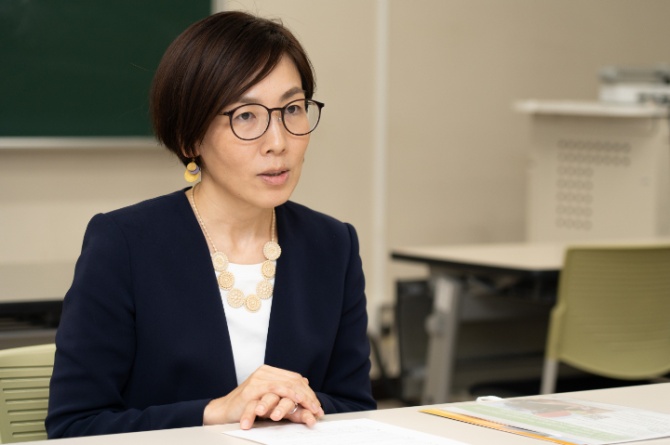
Kawaguchi Chigumi, a former research fellow at the JICA Ogata Sadako Research Institute for Peace and Development, was in charge of a research project on conflict and GBV.
In 2017, Kawaguchi led a research team in conducting field surveys of refugees who fled conflict-affected South Sudan to neighboring Uganda. The team collaborated with the Ugandan office of an international NGO to interview approximately 300 men and women in refugee settlements about their perceptions of GBV. This included questions on the GBV situation in refugee communities, what kind of help they can access if they are survivors, the actual pathways for seeking help, and what obstacles are encountered when seeking help.
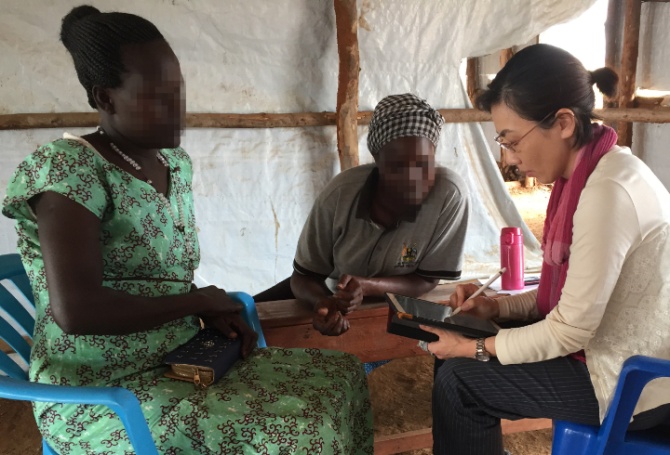
Kawaguchi (right) interviewing South Sudanese refugees in Uganda about GBV. *The identities of the interviewees have been obscured for their protection.
Conflict-affected GBV is the act of inflicting physical, mental, or sexual suffering on people on the basis of their gender and against their will, while they are in vulnerable situations due to conflict. The field surveys in Uganda revealed that in addition to rape by armed groups in their country, some refugees also suffered domestic violence in their homes and at the hands of close relatives, and were sold into marriage at a young age for money.
Through focus-group discussions with refugee men and women, Kawaguchi and her team confirmed the refugee communities' awareness of the various help-seeking pathways that are available depending on the different degrees of harm from domestic violence and rape, etc. In addition, they also learned that the refugees tend to seek help from the church in their refugee or host community, and that there is an order of priority as to whom they consult first.
What prevents the GBV survivors and communities from seeking help is not only the associated stigma and fear of bringing disgrace upon their families, but also the skepticism about the help available and the process of accessing it, which is not sufficient in terms of time and cost.
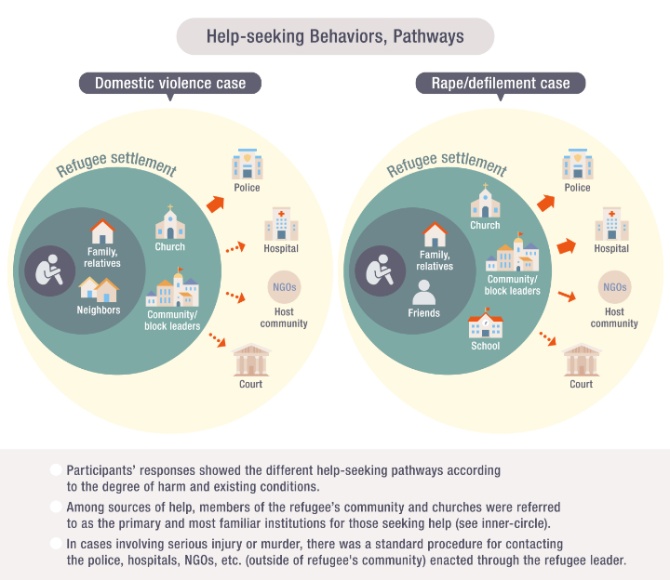
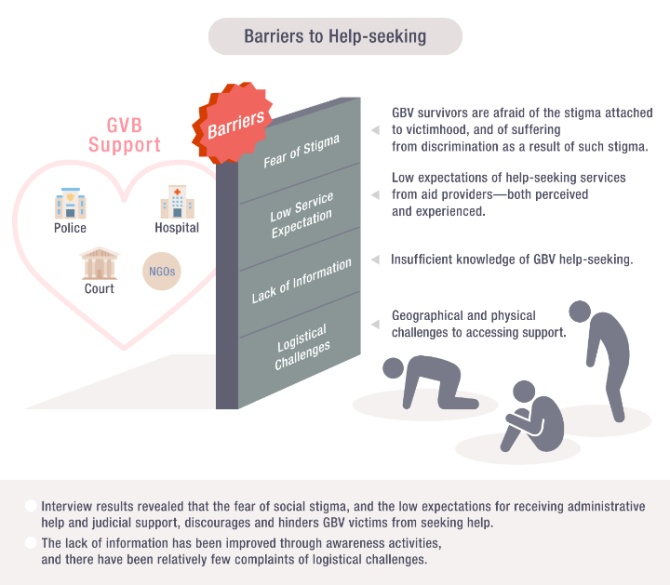
The interviews identified the help-seeking pathways (top) and barriers to help-seeking (bottom) in refugee communities
Source: JICA Ogata Research Institute’s research project pamphlet titled, “Conflict and Gender-Based Violence (GBV). The Role of Aid in the Help-Seeking and Recovery Process for Victims. Case Study of South Sudanese Refugees.”
“It is true that there are many people who, even after suffering from GBV, are afraid to seek help for fear that others will find out about it,” says Kawaguchi. “We have also discovered that, even after mustering the courage to seek it, victims and those around them abandon the idea of seeking help when they don’t get the help they hoped for. We believe it is important to create an environment in which it is easy for GBV victims and their families to seek help by developing and sustaining a quality and efficient support structure.”
JICA has provided a variety of support initiatives that have produced positive outcomes, and the research project has been groundbreaking. At the time of the project, there had been little research in Japan that not only focuses on the actual state of harm caused by GBV in conflict-affected refugee camps, but also on the process of seeking help. It is important to determine when, from whom, and what kind of help is sought by GBV victims."
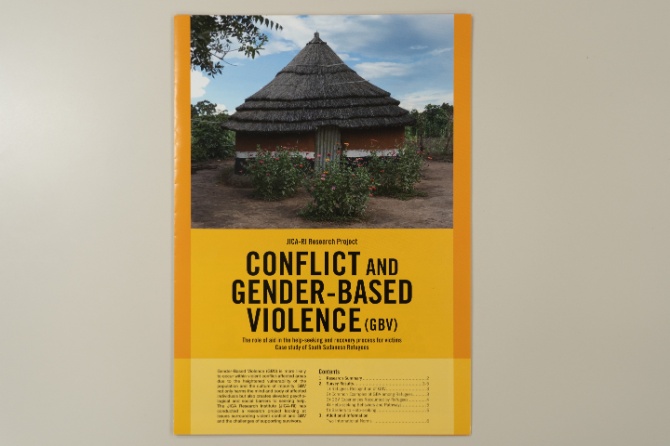
“Conflict and Gender-Based Violence (GBV). The Role of Aid in the Help-Seeking and Recovery Process for Victims. Case Study of South Sudanese Refugees.” This pamphlet based on the project’s research is designed to inform as many people as possible about this subject. (Printed in English (above) and Japanese) https://www.jica.go.jp/jica-ri/research/peace/l75nbg00000bwayb-att/GBV_pamphlet_A4_ENG_print.pdf
“GBV can affect both men and women, at any age,” she says. “Since survivors are primarily women and girls, the focus is mainly on violence against women.”
In a resolution on women, peace, and security adopted in 2000, the UN Security Council addressed the disproportionately large impact conflict has on women and girls in particular. It specified the need for special measures to protect women and girls from all forms of violence, including GBV.
However, subsequent resolutions have covered GBV more widely, i.e., not only that against women and girls.
“Men can also be victims of GBV,” says Kawaguchi. “But it is very difficult for them to seek help. The assumption that gender support is only for women is also a problem. Anyone can be a GBV victim, regardless of gender, so we need to focus our research on anyone who may be affected by GBV and come up with methods that can help them.”
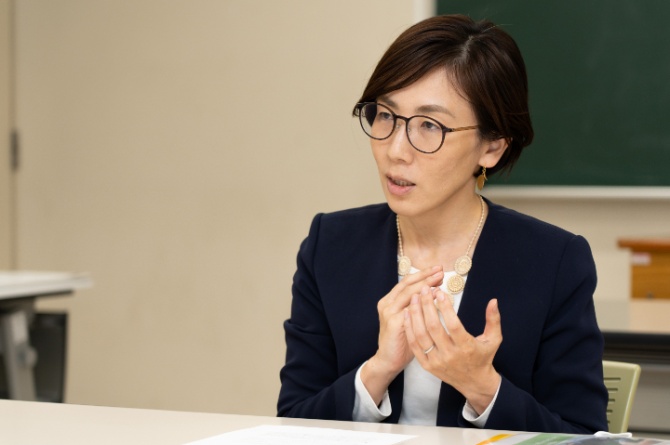
Kawaguchi was involved in the development of gender training for personnel dispatched on peace-keeping operations at the International Peace Cooperation Headquarters of the Cabinet Office. In the past, the issue of gender-based violence in conflict-affected areas has rarely been addressed as a government policy or research subject. While it is a serious violation of human rights abuses, it is also a sensitive issue to deal with.
“I think the fact that we were able to study GBV in conflict-affected areas at the JICA Ogata Research Institute is in itself a great achievement,” she says. “There is a steadily emerging network of researchers and NGOs in Japan that are working on the issue.”
Kawaguchi now holds a position at a Japanese university, where she works to spread awareness about conflict-affected GBV. As a researcher as well, she continues to share information about the issue. This has allowed her to create an environment in which the issue is more easily addressed in Japan's international cooperation efforts.
Kawaguchi offers seminar courses on international cooperation at Toyo Gakuen University in Bunkyo Ward, Tokyo. To join the global campaign to eliminate GBV, on November 25, the UN-designated International Day for the Elimination of Violence Against Women on November, Kawaguchi and her students will hold an event to address the issue of violence against women in Afghanistan.
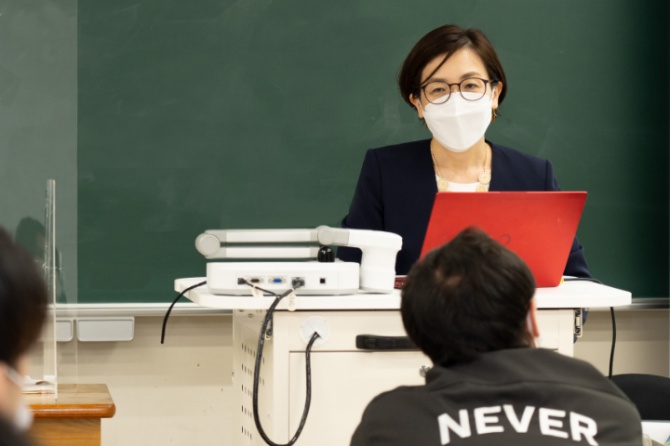
Kawaguchi conducting a seminar on international cooperation and aid at Toyo Gakuen University.
During her time as a graduate student, Kawaguchi was an intern for the Ministry of Foreign Affairs, and she participated in the International Conference on Reconstruction Assistance to Afghanistan co-chaired by the late Ogata Sadako. “Since then, I have not forgotten about Afghanistan, a country that tends to be overlooked.” She says that she chose the theme of violence against Afghan women because “we must not forget to support all women suffering from GBV, no matter where they live in the world.”.
“I want young people to be aware of the fact that GBV is especially likely to occur in societies that are affected by conflict, including refugee communities, and that these people need help,” she says. “GBV is unfortunately a problem that is universal and familiar to everyone. I want young people to think about those suffering from difficult situations in distant places, and to think about what they can do for them."
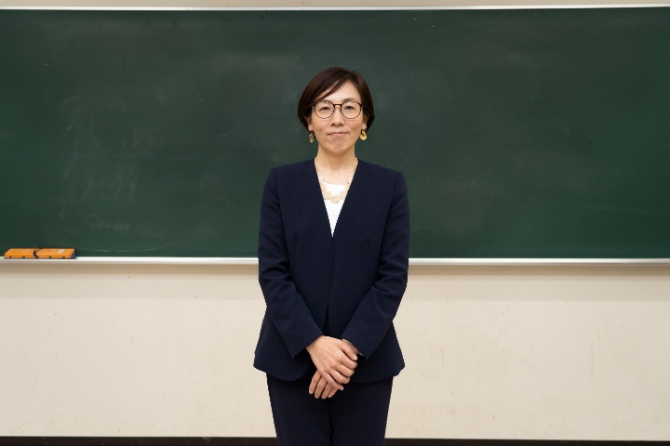
Kawaguchi Chigumi has a PhD in International Public Policy. She worked at the JICA Ogata Sadako Research Institute for Peace and Development from 2014 to 2021, after positions as a research officer at the Secretariat of the International Peace Cooperation Headquarters of the Cabinet Office, and an examiner at the International Peace Cooperation Division in the Foreign Policy Bureau of the Ministry of Foreign Affairs. She is currently an assistant professor at the Faculty of Global Communications at Toyo Gakuen University. Her fields of research and primary areas of study include international politics, policy studies, peacebuilding, international cooperation, and GBV in conflict-affected areas.
scroll